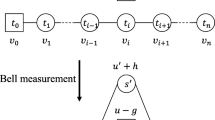Abstract
Recently, Shi et al. (Phys Rev A 92:022309, 2015) proposed quantum oblivious set member decision protocol where two legitimate parties, namely Alice and Bob, play a game. Alice has a secret k, and Bob has a set \(\{k_1,k_2,\ldots k_n\}\). The game is designed towards testing if the secret k is a member of the set possessed by Bob without revealing the identity of k. The output of the game will be either “Yes” (bit 1) or “No” (bit 0) and is generated at Bob’s place. Bob does not know the identity of k, and Alice does not know any element of the set. In a subsequent work (Shi et al in Quant Inf Process 15:363–371, 2016), the authors proposed a quantum scheme for private set intersection (PSI) where the client (Alice) gets the intersected elements with the help of a server (Bob) and the server knows nothing. In the present draft, we extended the game to compute the intersection of two computationally indistinguishable sets X and Y possessed by Alice and Bob, respectively. We consider Alice and Bob as rational players, i.e. they are neither “good” nor “bad”. They participate in the game towards maximizing their utilities. We prove that in this rational setting, the strategy profile ((cooperate, abort), (cooperate, abort)) is a strict Nash equilibrium. If ((cooperate, abort), (cooperate, abort)) is strict Nash, then fairness and correctness of the protocol are guaranteed.
Similar content being viewed by others
Notes
For the brevity of notation, in the rest of the paper, we will write \(\log (.)\) instead of \(\log _2(.)\).
M qubit string can be written as the tensor product of M individual qubits. As \(j\in \mathbb {Z_N^*}, j\) can be expressed in \(M=\log N\) bits. Each bit corresponds to a qubit. Thus \(\left| j\right\rangle \) can be written as \(\left| d_M\right\rangle ^{\otimes M}\), \(d_M\in \{0,1\}\) and \(M\in [1,\log N]\).
We assume that there is no payoff for a player who deviates from the game and gets partial knowledge about the functionality. In this case, partial knowledge is considered as no knowledge or \(\perp \).
References
Gordon, S.D., Hazay, C., Katz, J., Lindell, Y.: Complete fairness in secure two-party computation. In: Proceedings of the 40th Annual ACM Symposium on Theory of Computing (STOC), pp. 413–422. ACM Press (2008)
Asharov, G., Canetti, R., Hazay, C.: Towards a game theoretic view of secure computation. In: Advances in Cryptology—EUROCRYPT 2011, LNCS, vol. 6632, pp. 426–445 (2011)
Groce, A., Katz, J.: Fair computation with rational players. In: Advances in Cryptology—EUROCRYPT 2012, pp. 81–98. Springer, Berlin (2012)
Brunner, N., Linden, N.: Bell nonlocality and Bayesian game theory. Nat. Commun. 4, 2057 (2013)
Maitra, A., De, S.J., Paul, G., Pal, A.: Proposal for quantum rational secret sharing. Phys. Rev. A 92, 022305 (2015)
Hazay, C., Nissim, K.: Efficient set operations in the presence of malicious adversaries. J. Cryptol. 25, 383–433 (2012)
Hazay, C.: Oblivious polynomial evaluation and secure set-intersection from algebraic PRFs. In: TCC 2015, LNCS 9015, pp. 90–120 (2015)
Jarecki, S., Liu, X.: Efficient oblivious pseudorandom function with applications to adaptive OT and secure computation of set intersection. In: TCC 2009, LNCS 5444, pp. 577–594 (2009)
Diffie, W., Hellman, M.E.: New directions in cryptography. IEEE Trans. Inf. Theory 22, 644–654 (1976)
Stinson, D.: Cryptography Theory and Practice, 3rd edn. Chapman & Hall/CRC, Boca Raton (2005)
Shor, P.W.: Algorithms for quantum computation: discrete logarithms and factoring. In: Foundations of Computer Science (FOCS) 1994, pp. 124–134. IEEE Computer Society Press (1994)
Shi, R.-H., Mu, Y., Zhong, H., Zhang, S.: Quantum oblivious set-member decision protocol. Phys. Rev. A 92, 022309 (2015)
Shi, R.-H., Mu, Y., Zhong, H., Cui, J., Zhang, S.: An efficient quantum scheme for private set intersection. Quant. Inf. Process. 15, 363–371 (2016)
Gordon, S.D., Hazay, C., Katz, J., Lindell, Y.: Complete fairness in secure two-party computation. J. ACM (2011). https://doi.org/10.1145/2049697.2049698
Asharov, G., Lindell, Y.: Utility dependence in correct and fair rational secret sharing. J. Cryptol. 24, 157–202 (2010)
Yang, Y.G., Sun, S.J., Xu, P., Tiang, J.: Flexible protocol for quantum private query based on B92 protocol. Quantum Inf. Process. 13, 805–813 (2014)
Wilde, M.M.: Quantum Information Theory, p. 2. Cambridge University Press, Cambridge (2017)
Serfling, R.J.: Probability inequalities for the sum in sampling without replacement. Ann. Stat. 2, 39 (1974)
Wootters, W.K., Zurek, W.H.: A single quantum cannot be cloned. Nature 299, 802803 (1982)
Dieks, D.: Communication by EPR devices. Phys. Lett. A 92(6), 271272 (1982)
Freedman, M., Nissim, K., Pinkas, B.: Efficient private matching and set-intersection. In: EUROCRYPT’04, LNCS 3027, pp. 1–19. Springer, Berlin (2004)
Hazay, C., Lindell, Y.: Efficient protocols for set intersection and pattern matching with security against malicious and covert adversaries. In: 5th TCC, LNCS 4948, pp. 155–175. Springer, Berlin (2008)
Dachman-Soled, D., Malkin, T., Raykova, M., Yung, M.: Efficient robust private set intersection. In: ANCS, LNCS 5479, pp. 125–142. Springer, Berlin (2009)
Author information
Authors and Affiliations
Corresponding author
Rights and permissions
About this article
Cite this article
Maitra, A. Quantum secure two-party computation for set intersection with rational players. Quantum Inf Process 17, 197 (2018). https://doi.org/10.1007/s11128-018-1968-9
Received:
Accepted:
Published:
DOI: https://doi.org/10.1007/s11128-018-1968-9




